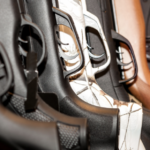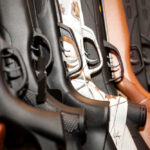The Offence of Unlawfully Importing a Firearm into Australia

A woman from the United States was arrested by Australian Border Force (ABF) earlier this week over allegations she attempted to import a firearm into Australia.
But the pistol was not just any old firearm – but a 24 carat gold plated piece– a stunning weapon, if you like that kind of thing.
The item, worth an estimated USD$2,000 in the United States, has been seized and the woman now faces up to 10 years behind bars if she is convicted over its alleged importation.
According to the ABF, the firearm is also unregistered.
As has often been said before, not knowing the laws is not an adequate defence for breaking them, even inadvertently.
Australia’s firearm laws are very different to those in the United States
The US and Australia have very different cultural attitudes towards gun ownership, and very different laws governing use and ownership.
In America, passengers on domestic flights can travel with firearms in a checked bag when they are unloaded and locked in a hard-sided case, and travellers must inform airline representatives that they intend to travel with the weapon during check-in.
In Australia, by contrast, in some states, including in New South Wales you need a gun license to own a gel blaster.
The National Firearms Agreement (NFA) established tighter firearm control laws back in 1996 by then Prime minister John Howards – it is perhaps his strongest legacy.
The NDA was initiated after the Port Arthur Massacre, when Martin Bryant, killed 35 people and wounded 23 others, the worst massacre in modern Australian history. Martin Bryant pleaded guilty and is serving 35 life sentences without the possibility of parole.
The Second Amendment
America has often looked at Australia’s tough laws as potentially ones to model, given its ongoing problem with children accessing guns and mass shootings. Although the political will may exist from time-to-time, it seems that the majority of Americans are not yet willing to give up their constitutional rights to own and carry a gun.
The 2nd Amendment states: “A well regulated Militia, being necessary to the security of a free State, the right of the people to keep and bear Arms, shall not be infringed.”
And this Amendment is regularly upheld by the courts. For example, In 2022, in the caseNew York State Rifle & Pistol Association v. Bruen,the Court considered the constitutionality under the Second Amendment of a portion of New York’s firearms licensing scheme that restricts the carrying of certain licensed firearms outside the home.
In a 6-3 decision, the Court overruled New York’s requirement that an applicant for an unrestricted license to carry a handgun outside the home for self-defense must establish proper cause, ruling that the requirement is at odds with the Second Amendment, recognising that the Second Amendment protects a right that extends beyond the home.
Gun licensing and registration in Australia
By contrast in Australia, a person must have a gun license to obtain a gun. That person must be over the age of 18, and be able to identify a genuine reason for wanting a gun licence, for example, sport/target shooting, recreational hunting, primary production, pest control, business or employment, collector, etc. In some cases ‘proof’ of this need or reason for a license may be required.
Gun license applicants must also pass a firearm safety course, and agree to specific background checks.
Any person who has a criminal record for what is known as a ‘prescribed offence’ cannot obtain a gun licence. These offences include: violent and sexual offences, offences related to prohibited drugs, robbery, terrorism offences, or offences relating to organised crime or criminal gangs.
Once a permit or licence has been granted, a person can buy a gun. However, the weapon must be registered and there are strict laws about how guns must be stored – separate from ammunition and in a locked cabinet.
Perpetual gun amnesty in place nation-wide
As of 2021, there has been an ongoing amnesty across all states and territories which enables people to hand in guns (and other weapons) they hold illegally. This gives people an opportunity to hand over these dangerous weapons without fear of being charged orn prosecuted.
It is a highly successful way of keeping illegal weapons off the street and out of the hands of criminals. In the first year of the amnesty in operation, more than 17,000 weapons were handed in, including some rare historic weapons and some of great value.
By and large, Australians are exceptionally compliant with gun laws. Figures published in 2021, which marked 25 years since the Port Arthur massacre show that there are more than 3.5 million registered firearms, an average of four for each licensed gun owner.
Further, the number of Australians who hold a gun licence has fallen by 48 percent since 1997, and the number of Australian households with a firearm has fallen by 75 percent in recent decades.
Data indicates that people who already own guns have bought more rather than an increase in new gun owners.
The offence of importing a firearm into Australia
Importing a firearm into Australia is an offence under section 233BAB of the Customs Act 1901 (Cth) which carries a maximum penalty of 10 years in prison and/or 2,500 penalty units.
A Commonwealth penalty unit is $222 at the time of writing, which means the maximum fine is currently $555,000.
To establish the offence, the prosecution must prove beyond reasonable doubt that:
- You imported a good into Australia,
- You did so intentionally,
- The good was a tier 2 good,
- You were at least reckless as to whether the good was a tier 2 good, and
- The importation of the good was prohibited absolutely under the Act, or
The importation of the good was prohibited under the Act without lawful approval, and that approval had not been obtained.
What is a tier 2 good?
The section stipulates that tier 2 goods include:
- specified firearms, munitions and military warfare items of any kind including combat vests and body armour,
- specified knives, daggers and other like goods,
- specified chemical compounds,
- specified anti-personnel sprays and gases,
- specified fissionable or radioactive substances,
- specified human body tissue,
- specified human body fluids,
- items of child abuse material,
- counterfeit credit, debit and charge cards, and
- other specified goods.
In relation to firearms, the Customs (Prohibited Imports) Regulations 1956 make clear that firearms, firearm accessories, firearm parts including magazines, ammunition and components of ammunition fall under the definition.
Legal defences
The Act provides that you are not guilty of the offence if you were legally authorised to import the firearm.
In that regard, firearms and their parts are tier 2 good that are legal to import with authorisation from the Defence Minister or other authorised person, and schedule 6 of the regulations sets out the legal requirements for the importation of these goods.
There are also statutory defences relating to the importation of firearms by members of defence forces of certain overseas countries, with strict rules attaching the any such importation.
General legal defences also apply to the charge, which include duress, necessity and self-defence.
Where you are able to raise evidence of a general legal defence, the onus then shifts to the prosecution to prove beyond a reasonable doubt that the defence does not apply.
You are entitled to a verdict of not guilty if the prosecution is unable to do this.
Going to court over an allegation under the Customs Act 1901?
If you are going to court for an offence under the Customs Act, call Sydney Criminal Lawyers anytime on (02) 9261 8881 for expert advice and formidable legal representation by a team of specialist criminal defence lawyers with a proven track record of consistently producing exceptional outcomes in these types of cases.








